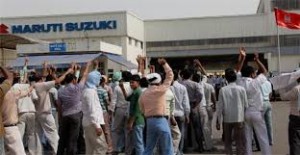In this blog post, Meghana Balan, a Bangalore-based Lawyer with an Independent Practice and a student pursuing a Diploma in Entrepreneurship Administration and Business Laws from NUJS, Kolkata, discusses the recent labour unrest and strike at Maruti.
Introduction
Maruti Udyog Limited or Maruti Suzuki India Limited (MSIL) as it is known today, was established in February 1981 and at one point was a largely government-owned company, with 74% stake held by the government and 26% by Suzuki Japan. Post liberalisation in 1991, the government started to reduce its stake in the company, and by the year 2007 had completely disinvested.  One of the earlier reasons for the labour discord, it has been told, is the fact that the workers were opposed to the idea of the government giving up control, as they felt, they were better protected under the government. The labour unrest began as early as the year 2000 when the employees of MSIL went on an indefinite strike, demanding among other things, revisions to their wages, incentives and pension. The discord between the company and its workers continued on and off and peaked in the year 2012.
One of the earlier reasons for the labour discord, it has been told, is the fact that the workers were opposed to the idea of the government giving up control, as they felt, they were better protected under the government. The labour unrest began as early as the year 2000 when the employees of MSIL went on an indefinite strike, demanding among other things, revisions to their wages, incentives and pension. The discord between the company and its workers continued on and off and peaked in the year 2012.
July 18th, 2012, saw one of India’s worst labour incidents with one person being killed and several injured. The company declared a ‘lock-out’ and several of its employees were arrested. The issue has hence been partially resolved, however, continue to simmer on and off.
Governing Laws
- Industrial Disputes Act, 1947
- Contract Labour (Regulation and Abolition) Act, 1970
Discussion
The MSIL labour unrest and strike brings to the forefront several labour practices that are questionable, to say the least. The fact is that, the labour laws in India need to be overhauled and reworked in order to plug the loopholes that allow companies to take advantage a largely uneducated work force and at the same time allow flexibility in hiring and termination so that companies are not discouraged from hiring workers on a permanent basis. The MSIL case which is still sub-judice is examined here below to understand the various human resource issues and the legislations that cover them.
It is commonly known that one of the major reasons for dispute in the MSIL Manesar plant was the fact that the company had hired several workers on a contract basis and there was allegedly a huge disparity compensation and benefits. The larger issue here is the fact that it seems to be the norm across industries to hire a percentage of workers on a contract or temporary basis and thereby to circumvent the protective provisions of labour laws.
Facts of the case
(as ascertained by newspaper reports)[1]
- MSIL in its Manesar factory had as of 2011, employed a total of 2,500 workmen, out of which 1,100 were permanent employees and the rest 1,400 consisted of workers on contract, apprentices and trainees.
- An unskilled contract worker was paid INR 5,500 a month, and a skilled contract worker (with an ITI diploma) INR 7,000 whereas permanent workers were paid close to INR18,000 per month.
- The benefits provided to a permanent employee included medical benefits, bus service, and paid leave, none of which were provided to workers on contract, although on ground, the nature of work remained the same for both categories of employees.
- The process for an individual to become a permanent employee at MSIL was lengthy and never guaranteed. A skilled worker had to work for a year as an apprentice and another three years as a trainee before he was made permanent, being an unskilled worker meant that there was little or no hope of being made permanent.

- In addition to these glaring disparities, the general working conditions were told to be ‘difficult’ with little or no time for breaks, huge deductions in pay for leave and almost non-existent pay for working extra time in case of workers who were not permanent employees.
- The MSIL Manesar Union is said to have made demands which included, a fivefold increase in basic salary, monthly conveyance of INR 10,000/-, laundry allowance of INR 3,000/, gift with every new launch, a house for every worker who wants one, cheaper house loans, seven weeks paid vacation, 40 days’ allowance for sick and casual leave.
- None of these terms were acceptable to MSIL and even before any solution could be found a stray incident involving the suspension of a worker is said to have triggered off serious violence on the 18th of July 2012, that ended with an HR manager being killed, several people in management (close to a 100) being injured, 9 policemen being injured and the plant being evacuated and sealed.
- MSIL called a lock-out citing security issues and claimed that none of the workers would be paid for the duration of the lock-out. Further, MSIL claimed that the difference in pay between the contract labourers and permanent workers was much smaller than claimed by the union and that MSIL gave its contract workers the best pay and benefits in the region.
- Over 90 workmen were arrested, in August 2012, MSIL dismissed 500 workers accused of participating in the violence and restarted operations.
What are the legal implications?
The term ‘strike’ is defined in Sec 2(q) of the Industrial Disputes Act, 1947 as a cessation of work by a body of persons employed in any industry acting in combination, or a concerted refusal, or a refusal, under a common understanding of any number of persons who are or have been so employed to continue to work or accept employment.
The provisions of the Act[2], lay down the procedure to be followed by employees who want to go on strike. A strike is considered illegal if said procedure is not followed. The consequence of an illegal strike includes imprisonment and fine[3], loss of wages[4] and dismissal of the workmen[5] (in the case of a violent illegal strike).
‘Lock-out’ as defined under the Act[6] means the temporary closing of employment or the suspension of work, or the refusal by an employer to continue to employ any number of persons employed by him. Lock-out is the counterpart of a strike; it is the option available to an employer, and the Act deals with it in the same terms as a strike. Therefore, lock-out like strike has to follow procedures laid down in the act for it to be considered legal. Illegal lock-out, like illegal strikes, carries penalties.
In the MSIL case, the strike called in July 18th, 2012 has been considered illegal and therefore the lock-out declared by MSIL is legal[7]. The actions taken by MSIL thereafter including dismissal of the workmen would be valid actions. The criminal cases filed against several of the employees are still sub-judice, and hence, a conclusion regarding the same may only be arrived when the case concludes.
However, it is important to note that in the MSIL case, although it would seem like MSIL did follow the labour laws including the minimum wages prescribed for that region, the facts of the case reflect the inherent injustice and unfairness meted out to a section of workers. Hiring labourers as contract and temporary workers to avoid paying for their benefits while the level of work and skill required by both categories remaining same has been the main cause for dispute. And although the Contract Labour (Regulation and Abolition) Act, 1970 mandates that any company that has to employ contract labour needs to obtain a license from the labour department and that the labour department can cancel the license if the rights of the contract labourers are abused. It is evident from the facts of this case that these provisions were not implemented.
Current position at MSIL
Since 2013, MSIL has actively cut down on hiring workers as contract labourers and is said to be engaging workers on a temporary basis instead. The temporary workers are hired for short durations, not exceeding 7 -8 months with no guarantee of being re-engaged at the end of the term. MSIL claims that the current permanent to temporary workmen ratio is 70-30 at best.
Despite MSIL’s stop-gap solution, the issues between the management of MSIL and its workers temporary and permanent seem to continue. Even as recently as September 2015, there was strikes and lathi charge. MSIL having given permanent employees a 38 percent hike in wages, (over three years) the temporary workers demanded similar hikes. As things stand, the temporary workers were also given a 10 percent hike in wages in October 2015.
Labour issues at MSIL seem to be on a simmer right now, with no permanent change in policy, it is a matter of time before things come to a boil once more.
Conclusion
India in a bid to protect the interests of the workers has legislated several labour laws, however, it is commonly accepted that the laws are too complex and have given rise to complicated processes due to which most companies have found alternate means of doing business that largely circumvents the protective laws.
The labour laws are either avoided or poorly implemented; therefore the percentage of workers actually protected by the legislations are small, and a large populace of workers are left to fend for themselves. In a country where there is a huge population of unemployed, unskilled labour, companies rarely find it hard to replace workers who ask for more, skilled or otherwise.
In conclusion, one may note that unless the human element is taken into account and fair treatment to all workers, temporary or permanent is meted out, labour unrests and strikes are bound to raise. In today’s Internet-connected world where information is literally at one’s fingertips, unfair practices will meet protests.
Labour laws are in need of being overhauled and while doing so, taking the opinions of the people concerned both labour unions and industry leaders is highly recommended.
References:
[1] Business Standard report dated September 15, 2011
The Hindu report dated September 26, 2015
[2] Section 22 and Section 23 of the Industrial Disputes Act, 1947.
[3] Section 26 of the Industrial Disputes Act, 1947.
[4] Crompton Greaves Ltd. Vs Its Workmen (AIR 1978 SC 1489, 1978)
[5] M/S. Burn & Co. Ltd. & Others vs Their Employees (AIR 896, 1960 SCR)
[6] Section 2(1) of the Industrial Disputes Act, 1947.
[7] Section 24(3) of the Industrial Disputes Act, 1947.
 Serato DJ Crack 2025Serato DJ PRO Crack
Serato DJ Crack 2025Serato DJ PRO Crack










 Allow notifications
Allow notifications



it was a big issue at that time and due to this the operation at manesar factory stopped during the strike period which impacts the MSIL .Finally they resolved the issue on the mutual grounds.
The writing is truly enlightening and refreshing. Kudos.